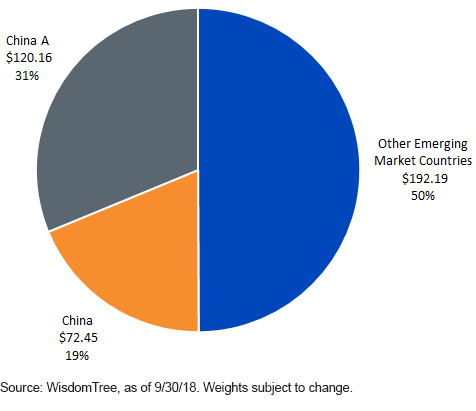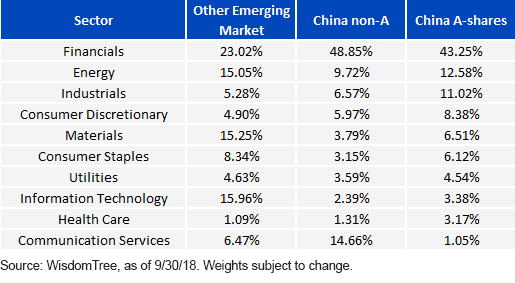Examining the Opportunity in China



After approximately five years and four consultations, MSCI has finally included around 230 A-share constituents as part of its MSCI Emerging Markets Index. It has limited the exposure to around 5% of a company’s adjusted market cap, representing less than 1% total exposure for the MSCI Emerging Markets Index. MSCI has issued another consultation on increasing the inclusion from 5% to 20% of a company’s adjusted market cap, potentially increasing total A-share exposure to 2.8% by August 2019. Eventually, at full inclusion, it is expected the total China exposure to grow to 40% of the MSCI Emerging Markets Index.
WisdomTree continues to remain ahead of the opportunity in China, having already included A-shares in both the WisdomTree Emerging Markets ex-State-Owned Enterprises Index and the WisdomTree China ex-State-Owned Enterprises Index, at a 5% and 25% exposure, respectively, since August 2017.
Incorporating A-Shares in the WisdomTree Emerging Markets Dividend Indexes
Effective as of the October annual rebalance, WisdomTree increased the number of our Indexes with A-share exposure by adding Chinese domestic listed equities that were eligible to be purchased on the Stock Connect program in the Indexes listed below. Each Index added approximately 100 companies based on the underlying rules, and the Chinese domestic exposure was capped at 5%.
- WisdomTree Emerging Markets Dividend Index: Added the 100 largest Chinese domestic-listed companies by dividend market capitalization.
- WisdomTree Emerging Markets High Dividend Index: Added 100 Chinese domestic-listed companies by highest dividend yield.
- WisdomTree Emerging Markets SmallCap Dividend Index: Added the 100 largest Chinese domestic-listed companies, based on the bottom 10% market capitalization cutoff of the WisdomTree Emerging Markets Dividend Index without A-shares.
Through the screening process, we examined over $10 trillion of Chinese securities market cap, including domestic-, Hong Kong- and overseas-listed securities. No surprise, the largest market is the on-shore or domestic market—from a market cap perspective, making up around $7 trillion. Through the Stock Connect program, worldwide investors can access over 1,400 stocks, with a market cap over $5.0 trillion. To put this into perspective, the Chinese H-share market in Hong Kong represents about $3.0 trillion in market cap, with the overseas markets making up another $700 billion.
These Chinese companies are not only large from a market cap perspective, they also pay a lot of dividends—close to $200 billion total. When compared with other emerging market countries within the WisdomTree Emerging Markets Dividend Index, it is a little over half of the total dividends paid.
Emerging Market Dividend Stream ($ Billions)

From a sector perspective, the A-share dividend payers (like the non-A shares) represent in large part “Old China,” with over 50% deriving from the Financials and Energy sectors. The top dividend payers are a “Who’s Who” of well-known state-owned enterprises, the likes of China Construction Bank, Industrial and Commercial Bank of China, China Mobile, China Petroleum & Chemical Corp., etc. What’s missing is the large private sector technology names like Alibaba, Baidu and JD.com, all which have chosen to list overseas on markets in the United States. While Tencent does pay a dividend, its yield is relatively low for any market, at around 0.32%.

As mentioned earlier, to limit the impact of incorporating such a vast new investment opportunity, WisdomTree has capped the number of names and exposure in each of the Indexes that are changing. In subsequent posts, we will dive deeper into the impact for the WisdomTree Indexes and highlight the fundamental characteristics of these new constituents.
Important Risks Related to this Article
Investing in Chinese issuers involves special risks, including (but not limited to): currency devaluations and exchange rate fluctuations; intervention by the Chinese government (including risk of nationalization or expropriation); higher rates of inflation; greater political, economic and social uncertainty; market volatility; and lack of market liquidity. The Chinese financial sector is undergoing significant structural and regulatory changes, which have the potential to adversely affect the profitability of Chinese financial companies. The global deterioration of the credit markets since late 2007 generally has had an adverse impact on a wide range of U.S. and international financial institutions and markets. These domestic and global factors may make Chinese financial companies especially vulnerable to losses from rising interest rates, loan defaults, price competition, and credit and equity bubbles and crashes. Consequently, securities issued by Chinese financial companies may exhibit dramatic market price fluctuations. A Shares are equity securities issued by companies incorporated in mainland china and are denominated and traded in renminbi on the Shenzehen and Shanghai Stock Exchanges. Subject to minor exceptions, under current regulations in the People’s Republic of China, foreign investors can invest in the domestic securities market only through certain foreign institutional investors that have obtained status as a Qualified Foreign Investor (“QFII”) or a Renminbi Qualified Foreign Institutional Investor (“RQFII”) from the China Securities Regulatory Commission and have been granted a specific aggregate dollar investment quota.


